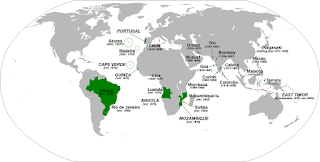Portugal was the first European state to conquer the transoceanic colonies and the last to lose them, lasting almost six hundred years; from the occupation of Ceuta in 1415, to the return of Macao to China in 1999.
Confining with Castile alone, which separated it from the rest of Europe and the Mediterranean, Portugal had no choice but to expand through the seas. The Portuguese sailors began to explore the coast of Africa and the Atlantic archipelago, using recent developments in navigation, cartography and maritime technology in search of a sea route to the source of the lucrative spice trade.
In 1487, Bartolomeo Diaz doubled the Cape of Good Hope and in 1498 Vasco da Gama reached India, establishing the first outposts. The Portuguese, beginning a rather aggressive expansion. Forced to defend their trade routes by both Europeans and Asians, they created several fortified bases along the eastern route to India. The Portuguese dominated not only trade between Asia and Europe, but also those between the various Asian regions, including India , Indonesia, China, and Japan. In many cases the Jesuit missionaries followed the Portuguese merchants trying to spread Christianity to Asia.
In 1500, Brazil was discovered and the actual colonization began around 1530. Although at the beginning it was considered less important than the Asian territories, Brazil became the most important colony of the empire, from which the Portuguese could export gold, gems precious, sugar, coffee and other agricultural products.
With the occupation of the throne of Portugal by the Habsburgs of Spain, the decline of the Portuguese empire began. The enemies of Spain, eager to take possession of its riches overseas, found it easier to attack the Portuguese bases, poorly defended rather than the Spanish ones.
The British managed to assert their control over India, reducing the Portuguese territories to small bases. Brazil remained the heart of the empire until 1822 when it became independent.
Portugal began to expand its outposts in Africa, triggering strong competition with other European powers present in the area. The colonies were created which today correspond to the states of Cape Verde, São Tomé and Príncipe, Guinea-Bissau, Angola and Mozambique.
In the years following the end of the Second World War, Portugal fiercely opposed the process of decolonization, thus becoming the last colonial power to maintain control over its larger colonies.
My stamps

No comments:
Post a Comment